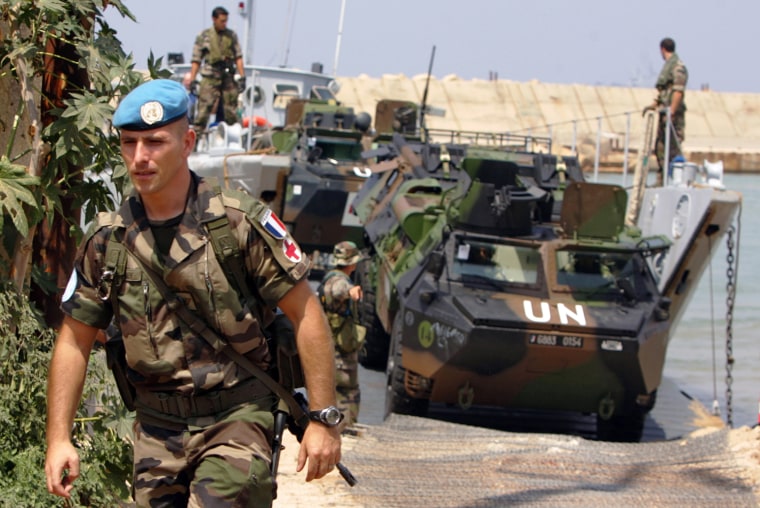The Israeli government said Saturday it is asking friendly Muslim countries to contribute troops to the U.N. force that is to help police the cease-fire in southern Lebanon between Israel and Hezbollah.
The U.N. wants Muslim troops included to lend credibility in the region to what so far is a mostly European force, and the predominantly Islamic nations of Indonesia, Bangladesh and Malaysia have offered to participate.
But none of those recognize Israel, which says it would be reluctant to share intelligence with a force that included Muslim nations it doesn’t have relations with. While Israel does not have any veto, its opposition to a country could influence which troops are included.
Israeli Foreign Ministry spokesman Mark Regev said Israel had spoken to the governments of several Muslim nations with which it has diplomatic relations, but primarily to Turkey. Turkey, which would be acceptable to all parties, has not decided whether to join the mission.
“If Turkey decides to send a contingent, we would welcome that,” Regev said.
He did not specify the other nations contacted by Israel, but Jordan and Egypt are among the Muslim countries that Israel has relations with.
Hezbollah pledges to keep arms
The difficulties facing the nascent force were already apparent, with a top Hezbollah official saying in a defiant interview published Saturday that the Shiite Muslim guerrilla group would keep its weapons despite international pressure to disarm.
Sheik Naim Kassem, the group’s deputy leader, also told the Lebanese newspaper An-Nahar that Hezbollah’s “resistance” to Israel would continue. “Justifications for ending it do not exist,” he said.
Kassem’s remarks underscored the fragility of the U.N.-brokered cease-fire.
Five Lebanese, included four children from the same family, were wounded by cluster bombs left over from the Israeli offensive. They exploded in two southern Lebanese villages on Saturday, Lebanese security officials said.
One cluster bomb exploded outside a home in the village of Blida, wounding four children from the same family, the officials said. It was not clear whether the children, whose ages were not immediately known, were playing with the bomb or had stepped on it by accident.
Separately, a Lebanese shepherd was wounded when another cluster bomb exploded in the border village of Aitaroun, less than three miles south of Blida.
Since a U.N.-brokered cease-fire took hold Aug. 14, eight Lebanese have been killed by exploding ordnance, including two children, and 38 people have been wounded
New pledges of assistance
The cease-fire stipulates the deployment of the U.N. force along Lebanon’s border. The international force is to reinforce the Lebanese army, which is moving 15,000 soldiers of its own into the south. The troops are Lebanon’s first assertion of central authority in the south in decades.
European Union nations pledged 6,900 soldiers Friday, dispelling concerns the peacekeeping force might not materialize because of reluctance to send troops without clear instructions or authorization to use their weapons. But the force was still far short of the 15,000 soldiers envisioned under the U.N. resolution.
Questions remained over whether Hezbollah would be allowed to remain an armed force.
U.N. Secretary-General Kofi Annan stressed Friday it would not be the peacekeepers’ task to strip the guerrillas of their weapons, saying that was an issue for Lebanon’s government and “cannot be done by force.”
Regev reiterated Israel would not lift its air and sea embargo of Lebanon until peacekeepers and the Lebanese army deploy along the Syrian border to block arms shipments to Hezbollah from its two main supporters, Iran and Syria.
Syria, Iran meet to discuss conflict
Both nations deny helping Hezbollah. But Syria’s state news agency said Iranian Deputy Foreign Minister Mahammad Rida Baqeri was in Damascus on Saturday to discuss the “repercussions of the latest Israeli aggression in Lebanon.”
Lebanese Prime Minister Fuad Saniora’s office released a statement saying Secretary of State Condoleezza Rice called the premier Saturday and said she was exerting “serious and prompt” efforts to get the Israeli blockade lifted as soon as possible.
Rice also stressed the importance of Lebanese authorities controlling the country’s border crossings, and Saniora said his government was going ahead with its plan to police the crossings on its own, the statement said.
There was no immediate comment from the State Department.
Earlier in the day, Lebanese Information Minister Ghazi Aridi criticized the United States over the blockade.
“We regret to say that the U.S. administration stands by Israel on this, and we absolutely condemn and reject this position,” he told reporters in Beirut.
He urged the international community to help get the blockade lifted “because we in Lebanon cannot endure more humiliation.” While aimed at Hezbollah arms shipments, the blockade also is hindering shipments of food, fuel and other goods to Lebanon.
The debate over policing the Syrian border is unlikely to delay Israel’s withdrawal of troops from Lebanon. After what many consider a mismanaged war, the Israeli public is pressuring the government to get the army out quickly.
